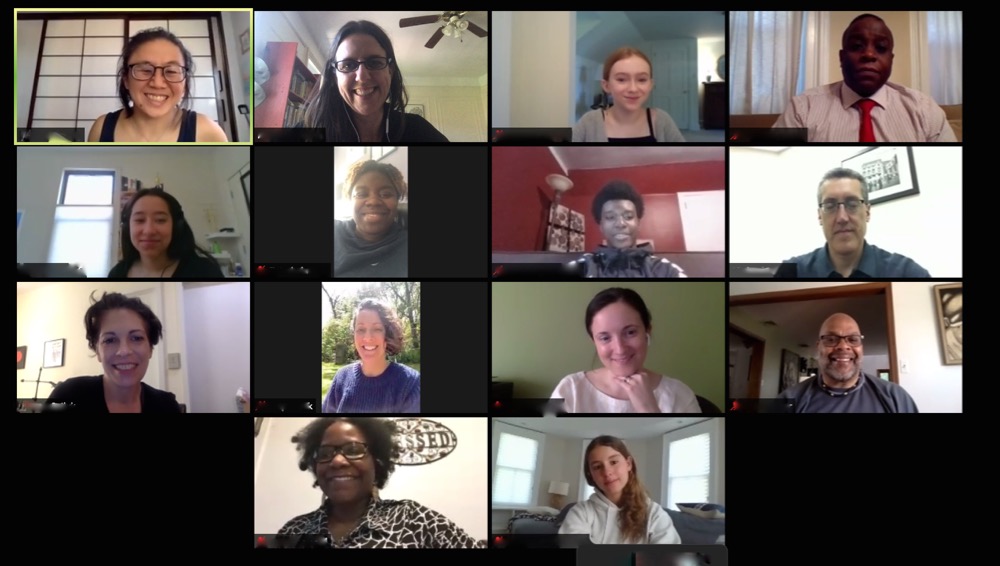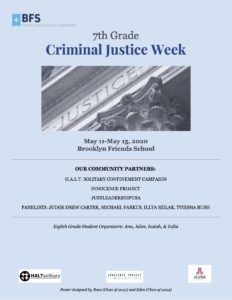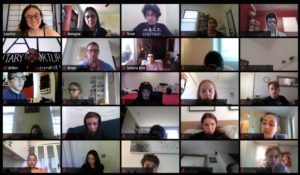7th Grade Criminal Justice Conference at Virtual BFS

By: Ana N. ’24
Since its origination in 2018, BFS has held an annual Criminal Justice Conference for its seventh graders. In the past, we have partnered with different organizations for this conference including the Brooklyn Defenders, Red Hook Community Justice Center of the Center for Court Innovation, The Innocence Project, New York Civil Liberties Union (teen activist project), New York City Department of Correction (Youthful Offender Division), Brooklyn Movement Center, Campaign Against Isolated Confinement (CAIC), Just Leadership USA, Brooklyn Justice Initiatives, HALT Solitary Campaign, Books Through Bars.
This year, Natania Kremer and several eighth-graders began to plan a criminal justice conference for March, including many of these organizations. The seventh grade experienced a preview of the conference on the 6th of March presented by eighth-graders, all of whom had participated in the conference last year. In this presentation, seventh-graders learned about the purpose of the criminal justice conference and what it entails. They were also presented with each community partner that was to present during the conference and what their mission was. The following presentation was expected on the 11th of March where panelists would be revealed and the schedule for the conference the following day would be presented. A number of eighth-graders also planned to talk about their experiences with activism and criminal justice, having participated in the conference last year and many having gone to Albany in support of HALT Solitary. Unfortunately, that presentation was canceled, as school closed because of COVID-19 on Monday, March 9th. We had to quickly re-adjust as BFS students switched to virtual school. The same planning group for the conference met via zoom meetings, still motivated to reinvent the conference in a way that would be meaningful to the seventh graders.
Eighth-grade planners, alongside Natania Kremer and Kevin Cooney, began meeting on zoom and continuing to move forward in designing a sound virtual conference. This corona setback actually resulted in amazing collaborative work–we saw an influx of seventh-grade interest in organizing the conference. Rosa G. and Sadie F. volunteered to make posters and guide discussions. Zora A. worked with our team as well to have her uncle, who is with the Innocence Project, be part of the conference. Adult organizers and a handful of seventh and eighth-graders worked to schedule events, come up with questions for guests and panelists, brainstorm queries for the quaker meeting following the conference, and establish a solid lineup of revised community partner organizations to participate in our conference.
We ultimately welcomed speakers from the following organizations: Just Leadership USA, HALT Solitary Campaign, and the Innocence Project. On Monday, May 11th, eighth-grade planners kicked off the Seventh Grade Criminal Justice Conference Week by refreshing students on community partners, discussing their experience in Albany, and presenting a revised schedule for the week (view the presentation here). On Tuesday, the seventh grade heard from a panel of BFS parents who have job experience within the criminal justice system. Michael Farkas, a criminal defense attorney, Drew Carter, a federal district judge, Tyiesha Bush, a police officer for over 10 years, and Illya Szilak, a physician at Rikers, answered questions posed by eighth-graders. These questions and their responses tackled discrimination, flaws, and needed change in the criminal justice system. Panelists also described the process of being found guilty and noted how it’s even harder being innocent in the system. A key point brought up was that there is a harmful emphasis on jailing people in our society, rather than a focus on keeping people out of jail. This was a powerful and important panel session that outlined not only how the system works, but also how it fails to work in certain ways. Students took valuable information away from this panel with seventh-graders commenting “that we need to get the focus off going to jail and instead try to re-educate and re-introduce people into society” and how “the consequences vary from person to person even if the crime is the same just because of their skin color.” Others remarked on “how corrupt the system is” and “the amount of bias in the system”. After this panel session, students were given a space in their advisories to debrief and reflect on what was said.
On Wednesday, each student attended one of two breakout sessions hosted by community partner organizations HALT Solitary and Just Leadership USA. These groups were decided based on the preferences students had shown previously in a google form. Presenters included Jack Davis and Scott Paltrowitz, HALT organizers and advocates, as well as Victor Pate, who is also a NY CAIC (Campaign for Alternatives to long term Isolated Confinement) Statewide Organizer. They described the mission of the HALT campaign and educated students on the danger and long-term effects of solitary confinement. Jack and Victor, being formerly incarcerated, gave firsthand accounts of what solitary confinement is like in terms of spatial, social, and conditional limitations. They also outlined different ways to take action in order to “dismantle the racial injustices and punishment paradigm that underpin the entire incarceration system”. Students noted these paths of action as they reflected: “I could join local efforts” “I can contact legislators”, “I can spread awareness” “We can protest”. Sarita Daftary, a Senior Community Organizer with JustLeadershipUSA and Victor Herrera, a JLUSA member, and leader of the #CLOSErikers campaign spoke to students about policy reform and cutting the US correctional population in #halfby2030. Sarita and Victor brought attention to misguided policies such as mandatory minimums, three-strikes laws, and reductions in the availability of parole and other early release mechanisms that cause such high incarceration rates. They described and proposed a “decarcerated” America through targeted advocacy, strengthening leadership, and membership support. Seventh graders took away important action opportunities from this session, saying “it’s really important for young people to take charge and email and call representatives in our governments” From reflections, it is safe to say that these break out sessions had a profound impact on the seventh grade, as we garnered a lot of interest from students around the possibility of going to Albany to fight for HALT Solitary and contacting legislators to advocate for justice reform. These powerful sessions were followed by another debrief in advisories.
On Friday, the final day of the criminal justice conference, the seventh grade heard from members of the Innocence Project. Seventh-graders Rosa and Sadie introduced presenters Alexis Agathocleous, a staff attorney with the strategic litigation department at the Innocence Project and a parent of a BFS seventh grader, as well as Huwe Burton, an Innocence Project exoneree who was wrongfully convicted of murder at age 16 and served 19 years in prison. In this session, Huwe and Alexis explained the work of the Innocence Project and educated students on the various details behind wrongful convictions. Alexis, having previously worked at the Center for Constitutional Rights (CCR), the American Civil Liberties Union (ACLU), and the Office of the Appellate Defender, detailed what goes into coerced confessions and how laws fail to prevent them, or rather the lack thereof. Huwe gave a firsthand account of the corruption and cronyism that enters these systems of “justice” and explained what lead to his false confession–the pressure he faced and coercion in relentless interrogations. He went further and talked about how challenging it was for him mentally to come to grips with his wrongful conviction, let alone process his mother’s death. However, something that stood out to everyone about Huwe was his strength of mind, and when asked how he coped with all of the wrongs done against him and the lack of justice served for so many years, he responded optimistically saying how it’s important to remain positive and hopeful. His story and outlook had a clear impact on everyone listening. Later, students reflected:
- “I thought it was very sad but also inspiring with what I could do to make a difference.”
- “There are a lot of flaws in our system and not a lot of laws to stop people from committing these injustices.”
- “I liked that we got to talk to someone who had first hand experience with the injustices of our system.”
- “I was surprised at how corrupt the justice system is.”
- “Huwe’s story really stuck with me, and made me want to take action.”
- “My takeaway from the Innocence Project session on Friday was that the way our criminal justice system works and what the police are legally allowed to do in order to get a confession out of a person is just awful and we should all try to do whatever we can to put an end to it.”
- “This session was the most impactful part of the week for me. Hearing firsthand the sort of injustice our law system has put people through really inspired me to get more involved with the issue.”
- “That stories of people mistreated by the systems aren’t just in the newspapers, but really real. Not far away at all.”
Huwe communicated to the seventh grade how important it was to him that people were interested in listening to his story and his message. This same gratitude was shared by students who later partook in a grade-level quaker meeting which held the query: What will you take away from this experience and how will you bring it to your everyday life?
This criminal justice conference was one of the most moving experiences of my eighth-grade year for many reasons. It felt like this conference came full circle: I experienced a criminal justice conference last year that was similar to this one but at the same time, vastly different. I participated as a seventh-grader, with little to no knowledge about our justice system and having not involved myself in any social justice efforts. I listened to the panel comprised of Judge Carter, Mr. Farkas, and Ms. Szilak, and heard Jack and Roger’s stories from HALT Solitary. They spoke of the terrible effects of this kind of punishment, which is truly torture, and brought attention to the reform that was needed. Jack and Roger also mentioned a trip to Albany where people planned to rally and demand that the HALT Solitary bill be passed. He invited students to go with him and I remember thinking how interesting but also outlandish that seemed. I let the trip stay as a thought. Later that year, I went on my grade-wide trip to Philadelphia and visited the Eastern State Penitentiary, where the practice of solitary confinement originated–it was noted that this practice was founded by Quakers whose intention was for prisoners to reflect on themselves while confined to a cell. In my tour, this fact was treated as an interesting concept and novel idea, yet I thought of Jack and Roger’s account of solitary, a horrifying practice and had crippling mental effects, and it didn’t feel like an innocent and interesting idea to learn as just a historical fact. It was this year that I heard mention of a HALT trip to Albany again, and when I was asked whether I wanted to go, I deliberated and later decided to–maybe because I felt more capable as an eighth-grader. I talked to friends and we decided that we were all interested, so nine of us learned more about HALT and prepared for our trip. On January 21st, we got up at 4 am, rode on the train at 5 to 14th street, and boarded a bus going to Albany at 6 am. In Albany, we heard from state representatives in favor of passing the HALT bill, we heard from HALT campaign organizers, we heard from survivors, we saw Jack and Roger by chance, we shouted, cheered, chanted, and sang to HALT Solitary so that Governor Cuomo would hear us. That day was beyond inspiring and when we came back, we were all excited to organize the seventh grade criminal justice week so that they could be inspired to take action and fight like we were. Executing and experiencing this conference was in some ways even more special than last year because it was promising to see younger students hearing these moving stories. It was even more exciting to see their interest in contacting legislators and potentially going to Albany to see the bill through. I am more than all hopeful to see what they will pursue this coming year.


